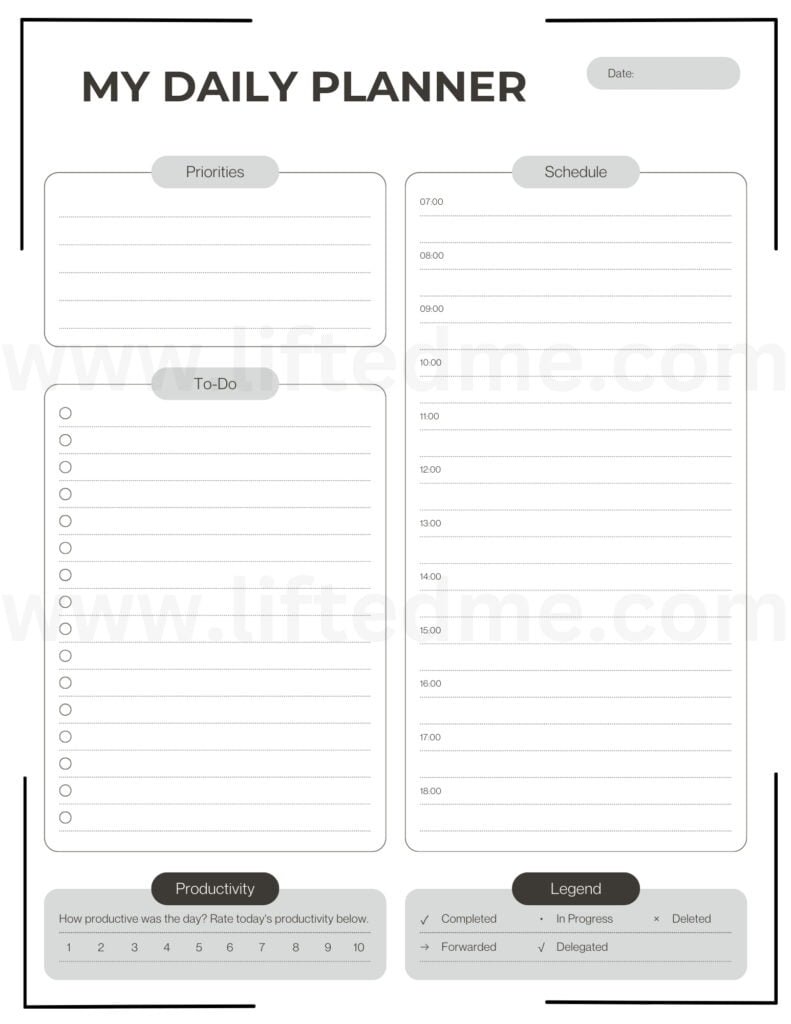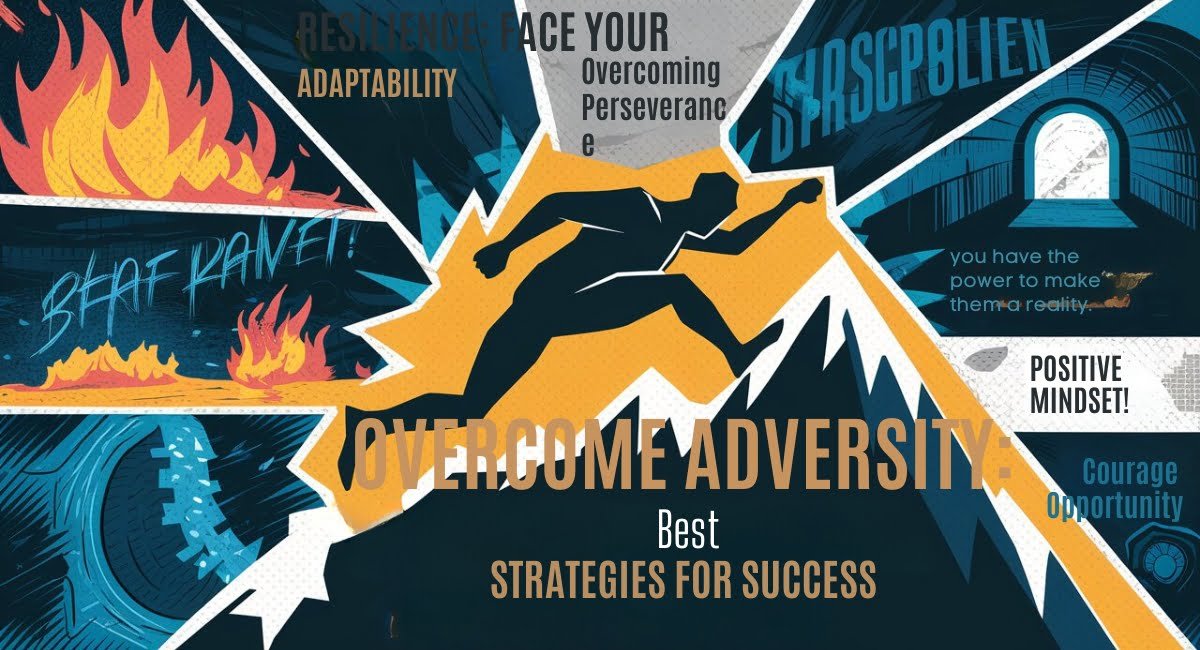Overcome Adversity: Best Strategies for Success
This post contains paid and/or affiliate links. I make a small commission at no extra cost to you. Please see our Privacy Policy.
Everyone faces adversity at some point in life. It can be self-doubt, injuries, rejection, poverty, losing someone close, or career struggles. Overcoming these challenges is hard but can strengthen us.
This article will share the top ways to beat adversity and grow stronger.

Key Takeaways
- Adversity can take various forms, including self-doubt, physical setbacks, rejection, financial hardship, and professional challenges.
- Maintaining a positive mindset and believing in oneself is crucial for successfully navigating through adversity.
- Developing daily habits like exercise, meditation, and proper nutrition can help prepare the body and mind to overcome challenges more effectively.
- Surrounding oneself with a supportive network of positive-minded individuals can significantly impact personal growth and resilience.
- Overcoming adversity can lead to valuable life lessons, such as perseverance, adaptability, and a renewed sense of purpose.
“Courage is not the absence of fear, but the triumph over it through relentless determination.”
What Is Adversity and Its Types
Adversity is a big part of life, bringing us many challenges that test our strength and resilience.
They can be self-doubt, physical injuries, rejection, poverty, losing someone close, or career issues. These can greatly affect our mental, emotional, and physical health.

The Six Types of Adversity
Knowing the different kinds of adversity helps us find ways to beat them. Here are the six main types of adversity people might face:
- Self-Doubt: Feeling unsure, lacking confidence, and seeing ourselves negatively can stop us from reaching our goals.
- Physical Injuries or Illnesses: Chronic pain and health issues can change our lives, making everyday tasks hard.
- Rejection: Getting rejected can be tough, making us feel not good enough and lowering our self-esteem.
- Poverty: Struggling with money can cause a lot of stress and limit our access to things we need.
- Loss of a Loved One: Losing someone close can be very hard, bringing a lot of sadness and emotional pain.
- Career Struggles: Finding a job, reaching career goals, or dealing with work can be a big challenge.
Understanding these types of adversity helps us prepare to face and overcome them, leading to personal growth and success.
| Type of Adversity | Potential Impacts | Recommended Strategies |
|---|---|---|
| , Positive self-talk, visualization, setting realistic goals | ||
| Physical Injuries or Illnesses | Chronic pain, limited mobility, reduced quality of life | Seeking medical treatment, practicing mindfulness, engaging in physical therapy |
| Rejection | Feelings of inadequacy, low self-worth, difficulty moving forward | Reframing rejection, building a supportive network, practicing self-compassion |
| Poverty | Stress, limited access to resources, lack of opportunities | Seeking financial assistance, developing budgeting skills, exploring education and job opportunities |
| Loss of a Loved One | Grief, emotional turmoil, difficulty coping with daily life | Seeking grief counseling, practicing self-care, engaging in support groups |
| Career Struggles | Unemployment, difficulty achieving goals, lack of job satisfaction | Updating skills, networking, exploring alternative career paths |
By facing and tackling these adversities, we can take steps to overcome them. This helps us grow personally and professionally.

What Is The Best Way To Overcome Adversity
Adversity is something we all face, from daily challenges to big life events. How we handle it can change everything. Here are some top ways to beat adversity:
Stop Making Excuses and Take Responsibility
First, stop blaming others and take charge of your situation. Blame doesn’t help you move forward. Focus on what you can do and take action to fix the problem.
Cultivate a Positive Mindset
Having a positive mindset is key when facing hard times. See challenges as chances to grow and learn, not just big problems.
Keeping a positive outlook and thinking of solutions can guide you through tough times.
“Challenges are the stepping stones to success; each one conquered brings you closer to your dreams.”
Maintain Discipline and Routines
During hard times, maintain discipline and daily routines. This will give you structure and stability and help you stay focused and grounded. Also, make sure to take care of yourself with exercise, healthy food, and enough sleep.
Learn from Mistakes and Failures
Hard times offer chances to learn and grow. Don’t get stuck on mistakes or failures. Think about what you can learn from them.
This approach helps you build the skills and resilience needed to face future challenges.
Using these strategies, you can develop a positive mindset, discipline, and focus. This will help you overcome adversity and emerge stronger.
Check out our Daily Journals Collection

Preparing Your Mindset for Adversity
Overcoming adversity is not just about being determined and hardworking. It also requires a smart mindset. People who think positively and focus on growth do better in tough times and come out stronger.
Positive self-talk is key to changing your mindset. By changing negative thoughts to positive ones, you build confidence and believe in yourself.
Visualization helps you see yourself beating obstacles, making you mentally stronger.
Having a growth mindset is vital for facing challenges. Instead of seeing failures as failures, you see them as chances to learn and improve. This way, you tackle problems with determination and resilience.
Studies show how important a positive mindset is. For example, having a clear purpose in life can make you $14,680 richer than those without one. Albert Bandura’s work also shows that believing in yourself helps you overcome obstacles better.
By working on your mindset to beat adversity, you can reach your full potential. You’ll face tough times with more confidence and resilience.
“In every setback, there’s a hidden opportunity waiting to be discovered and transformed into success.”
Building Inner Strength and Self-Confidence
Building inner strength and self-confidence is key to overcoming tough times. By thinking about past experiences and what we learned, we grow stronger.
Seeing our past wins and the lessons from hard times boosts our confidence, helping us stand strong against future challenges.

Learning from Past Experiences
A study by Harter and Marold (2016) showed that those with more self-confidence are happier and adjust better in life.
By seeing challenges as chances to learn, we build the strength to face them. Positive self-talk and setting realistic goals make us feel more confident and powerful.
- Think about past challenges and what they taught you
- Celebrate your wins, even the small ones
- Use positive self-talk to fight negative thoughts
- Set goals you can reach and watch your progress
Building self-confidence and inner strength is vital for bouncing back from tough times. By learning from the past and staying positive, we prepare to turn challenges into chances for growth, coming out stronger than ever.
Cultivating a Robust Support System
Overcoming adversity is tough, but a strong support system makes it easier. Being around positive, inspiring people gives you emotional support and practical help.
Getting advice from mental health experts like therapists or life coaches is also key to handling tough times well.
It’s important to build a circle of people who support you when you’re facing hard times. Studies show that groups with strong support systems have happier and more productive members, especially when things get tough.
Also, people who get professional help when they’re struggling tend to cope and recover better.
- Surround yourself with positive, encouraging people who can offer emotional support.
- Seek guidance from mental health professionals, such as therapists or life coaches, to navigate difficult situations.
- Cultivate a diverse network of supportive relationships, including family, friends, and colleagues.
- Engage in activities and communities that foster a sense of belonging and connection.
- Learn to effectively communicate your needs and vulnerabilities to your support system.
Building a strong support system is key to beating adversity and growing as a person. Resilient people bounce back fast from setbacks and keep moving forward.
By having a network of positive friends and getting professional help when you need it, you can face tough times with more strength and confidence.
“Your greatest strength lies in your ability to rise after every fall, stronger and more determined than before.”
Developing Daily Habits for Resilience
Building resilience means adapting and thriving when things get tough. A key way to do this is by making daily habits and routines. These habits give us stability and control, helping us face challenges.
Creating Routines and Discipline
Having a daily routine brings order and predictability. This is great when stress or uncertainty hits. It might include:
- Setting a regular sleep schedule and focusing on rest
- Adding physical activity, like exercise or being outdoors, to your day
- Setting time for self-care, like meditation or journaling
- Putting important tasks first and organizing your work or personal life
Sticking to these habits helps manage time, lowers stress, and moves you closer to your goals.
Even when things get hard. Being consistent and structured gives you the mental and emotional strength to tackle tough situations.
Studies show that resilience can shield us from mental health issues like depression and anxiety.
It also grows stronger with good relationships and regular exercise. By making daily habits that focus on self-care and discipline, we build the resilience to handle life’s ups and downs more easily.
| Daily Habit | Benefit for Resilience |
|---|---|
| Regular exercise | Releases endorphins, improves mood and reduces stress |
| Journaling | Facilitates self-reflection and a deeper understanding of emotions |
| Meditation | Quiets the mind, reduces anxiety and stress, and fosters inner peace |
| Content creation | Cultivates determination and a sense of purpose despite challenges |
| Weekly day trips | Provide enjoyment, a mood boost, and a change of scenery |
Adding these daily habits to our lives helps us build resilience and discipline. This way, we can overcome obstacles and do well, even when life gets tough.

Reframing Perspectives on Adversity
Adversity can feel like a heavy burden. But by reframing your perspective, you can turn it into a chance for growth. See challenges as a way to learn new skills and become more resilient.
About 60% of top entrepreneurs say adversity was key to their success. Those who face challenges and learn to deal with them become more adaptable and ready for the future.
By focusing on solutions, you can make the most of reframing adversity.
Getting support from friends, family, or experts can really help, with around 70% finding it effective. Being grateful can also change your outlook, as 80% of people feel better when they practice gratitude.
Finding meaning in tough times and keeping things in perspective helps you grow.
Ameritrade is a great example. This financial firm faced big challenges but came out strong. The CEO’s ability to see the positive in tough times led to more than 500% returns for shareholders over eight years. This shows how reframing adversity can lead to big wins.
Conclusion
We all experience tough times. It’s key to have good ways to handle these challenges.
By learning about different kinds of adversity, staying positive, building inner strength, and a strong support network, we can get through tough times and even emerge and have a stronger and more capable.
It’s not easy to beat adversity, but it’s vital for personal growth, success, and feeling fulfilled.
Societies that have faced many challenges often have a tighter-knit community. This shows that facing difficulties can bring people together.
Being able to beat adversity is part of being human. Building resilience allows us to recover from setbacks and grow.
By using the tips from this article, readers can start a journey toward personal growth and success.
FAQ
What is adversity, and what are the different types of adversity?
Adversity means facing a tough situation or hardship. It includes self-doubt, physical issues, rejection, poverty, losing someone close, and career struggles.
What are the best strategies for overcoming adversity?
To beat adversity, take charge of your situation and write down your feelings. Think positively, keep a routine, and focus on your goals. Learn from tough times and get the right skills.
How can you prepare your mindset to effectively overcome adversity?
Get your mindset ready by fighting negative thoughts and looking on the bright side. Use positive self-talk, visualization, and a growth mindset to tackle challenges with resilience.
How can you build inner strength and self-confidence to overcome adversity?
Think back on past challenges and what you learned from them. Celebrate your achievements and the lessons from hard times. This will boost your confidence and prepare you for future hurdles.
Why is it important to have a strong support system when overcoming adversity?
A strong support system with positive people is key. They offer emotional support, help, and honest advice. Mental health experts can also be a big help in tough times.
How can developing daily habits and routines help with overcoming adversity?
Stick to a daily plan, exercise regularly, and focus on what’s important. This will bring stability and control during hard times. It will also help you manage stress and reach your goals, even when things get tough.
How can reframing your perspective on adversity help you overcome challenges?
See adversity as a chance to grow and improve, not just a problem. This mindset lets you learn, gain new skills, and become more resilient. It turns negative experiences into positive ones.



